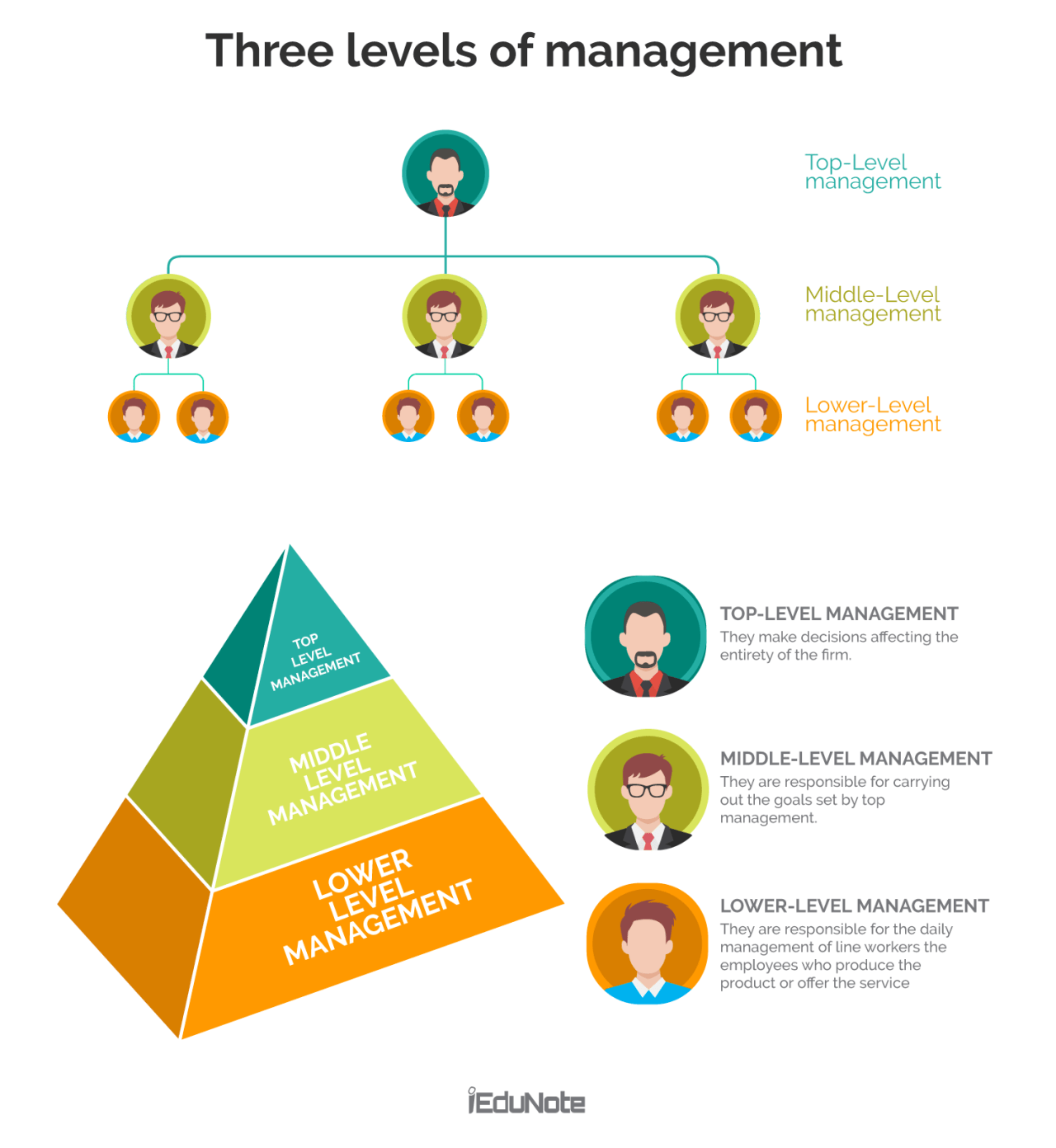The Crucial Role Of Middle Managers: Benefits For Companies And Employees

Table of Contents
Bridging the Gap: How Middle Managers Improve Communication and Collaboration
Effective middle managers are essential for seamless communication and collaboration within an organization. They act as a vital bridge, connecting the strategic vision of upper management with the daily operations of frontline staff.
Facilitating Communication Between Top Management and Frontline Staff:
Middle managers act as a crucial link, translating strategic objectives from upper management into actionable tasks for teams. This involves:
- Clear communication of company goals: Breaking down complex strategic plans into understandable, achievable steps for individual teams.
- Regular feedback loops: Establishing systems for consistent upward and downward communication, ensuring everyone is informed and aligned.
- Addressing concerns and clarifying ambiguities: Acting as a point of contact to resolve misunderstandings and prevent issues from escalating.
- Promoting transparency: Keeping teams informed about company performance, changes, and future plans.
This two-way communication fosters a stronger sense of shared purpose and alignment across the organization, leading to better overall performance. Effective communication strategies employed by middle managers directly impact team morale and productivity.
Boosting Team Cohesion and Collaboration:
Beyond inter-departmental communication, middle managers are key to building strong, cohesive teams. They achieve this by:
- Facilitating team building activities: Organizing events and initiatives to foster camaraderie and improve team dynamics.
- Encouraging open communication within teams: Creating a safe space for team members to share ideas, concerns, and feedback openly.
- Implementing effective conflict resolution strategies: Addressing disagreements promptly and fairly, ensuring a positive and productive work environment.
- Recognizing and rewarding contributions: Celebrating team successes and acknowledging individual achievements to boost morale and motivation.
These efforts cultivate a positive and productive team environment, leading to improved teamwork, higher morale, and increased productivity. Strong team dynamics are directly correlated to higher levels of employee engagement.
Driving Performance and Productivity Through Effective Middle Management
Middle managers are instrumental in driving performance and productivity within their teams. Their role extends beyond simply assigning tasks; it encompasses effective performance management and leadership development.
Setting Clear Expectations and Providing Constructive Feedback:
Middle managers are responsible for:
- Setting SMART goals: Establishing Specific, Measurable, Achievable, Relevant, and Time-bound goals for team members.
- Providing regular performance reviews: Offering constructive feedback, highlighting strengths and identifying areas for improvement.
- Implementing performance improvement plans: Working collaboratively with employees to address performance gaps and enhance skills.
- Monitoring progress and providing support: Ensuring team members have the resources and support needed to achieve their goals.
This clear goal setting and consistent feedback loop leads to increased accountability and higher productivity levels, directly impacting the company's bottom line.
Mentoring and Developing Future Leaders:
Effective middle managers actively participate in talent management by:
- Identifying high-potential employees: Recognizing individuals with leadership qualities and potential for growth.
- Providing mentorship and coaching: Guiding and supporting employees in their professional development.
- Creating opportunities for skill development: Offering training, assignments, and projects to enhance skills and experience.
- Preparing employees for advancement: Mentoring and supporting employees to take on more responsibility and leadership roles within the organization.
This focus on mentorship and leadership development creates a strong talent pipeline and ensures the long-term success of the company. Investing in employee growth through middle management directly improves employee retention and reduces recruitment costs.
The Impact of Effective Middle Management on Employee Satisfaction and Retention
Effective middle managers significantly influence employee satisfaction and retention. Their actions directly create a positive and supportive work environment.
Creating a Supportive and Inclusive Work Environment:
Middle managers play a critical role in:
- Fostering a culture of inclusivity and respect: Creating a workplace where every employee feels valued and respected, regardless of background or differences.
- Addressing employee concerns and resolving conflicts fairly: Acting as a mediator and advocate for their team members.
- Promoting open communication and feedback: Creating a safe space for employees to express their opinions and concerns without fear of retribution.
- Recognizing and appreciating employee contributions: Celebrating successes and acknowledging hard work to boost morale and motivation.
This leads to increased job satisfaction, stronger team cohesion, and higher employee retention rates, ultimately reducing recruitment costs and improving overall company productivity.
Promoting Work-Life Balance and Employee Wellbeing:
Effective middle managers prioritize employee wellbeing by:
- Supporting flexible work arrangements: Offering options like remote work or flexible hours to accommodate employees' needs.
- Encouraging time off and vacation: Promoting a healthy work-life balance to prevent burnout and improve overall well-being.
- Promoting employee wellness programs: Supporting initiatives aimed at improving physical and mental health.
- Creating a supportive and understanding work environment: Showing empathy and understanding towards employees' personal challenges.
This focus on work-life balance and employee wellbeing leads to improved employee health, reduced stress levels, and increased productivity. Happy, healthy employees are more productive and committed to their work.
Conclusion
In conclusion, the crucial role of middle managers cannot be overstated. They are the linchpin connecting upper management to frontline staff, driving performance, fostering collaboration, and boosting employee satisfaction. Investing in effective middle management strategies is an investment in the overall success of your company. By recognizing and nurturing the capabilities of your middle managers, you can unlock significant benefits for both your employees and your bottom line. Don't underestimate the power of strong middle management – it's crucial for a thriving organization. Invest in your middle managers today and reap the rewards of a more productive, engaged, and successful workforce.

Featured Posts
-
 Using Ai To Transform Repetitive Poop Data Into A Compelling Podcast
Apr 26, 2025
Using Ai To Transform Repetitive Poop Data Into A Compelling Podcast
Apr 26, 2025 -
 Trumps Proposed Ban On Congressional Stock Trading A Time Magazine Interview Analysis
Apr 26, 2025
Trumps Proposed Ban On Congressional Stock Trading A Time Magazine Interview Analysis
Apr 26, 2025 -
 Ai Powered Podcast Creation Turning Repetitive Scatological Documents Into Engaging Content
Apr 26, 2025
Ai Powered Podcast Creation Turning Repetitive Scatological Documents Into Engaging Content
Apr 26, 2025 -
 Soltan Kazimov And The Damen Csd 650 A Successful Launch
Apr 26, 2025
Soltan Kazimov And The Damen Csd 650 A Successful Launch
Apr 26, 2025 -
 Invest In Elon Musks Private Companies A New Investment Opportunity
Apr 26, 2025
Invest In Elon Musks Private Companies A New Investment Opportunity
Apr 26, 2025
